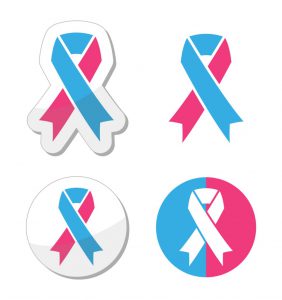October is Pregnancy and Infant Loss Awareness Month. 1 in 4 women are affected by pregnancy or infant loss, meaning there is a good chance someone you know has gone through the terrible tragedy of miscarriage, stillbirth, sudden infant death syndrome (SIDS), or other death of an infant. While the loss of a pregnancy and or an infant are topics that some might consider to be taboo, the goal of the creation of National Pregnancy and Infant Loss Awareness Month in 1988 was to undo that stigma.
Why Was Pregnancy And Infant Loss Awareness Month Created?

On October 15, 1988, President Ronald Reagan declared October as National Pregnancy and Infant Loss Awareness Month. When the proclamation was issued, Reagan said, “National observance of Pregnancy and Infant Loss Awareness Month offers us the opportunity to increase our understanding of the great tragedy involved in the deaths of unborn and newborn babies. It also enables us to consider how, as individuals and communities, we can meet the needs of bereaved parents and family members and work to prevent causes of these problems.”
There has long been a stigma or sense of shame associated with the loss of a baby that is undeserved. The term “miscarriage” implies that a mistake was made, which is hurtful, untrue, and unfair. Pain and grief can isolate us but destigmatizing infant loss is crucial to coping and healing.
Advocates then and now want grieving parents and families to know that losses don’t need to be hidden behind closed doors. People who haven’t experienced infant or pregnancy loss may feel uncomfortable talking about it, but this only increases the perceived shame and stigma associated with this type of loss. Observing Pregnancy and Infant Loss Awareness Month every October is a way to acknowledge loss, deal with the stigma, and help bereaved parents find ways to cope with the pain and move forward.
How Can You Support a Grieving Parent?
Unfortunately life doesn’t come with a manual. If it did, we would know how to support someone who has experienced pregnancy or infant loss. But fortunately, with the creation of Pregnancy and Infant Loss Awareness Month, information has become more readily available to help navigate relationships where there has been a loss. Here are some things to keep in mind if you are supporting a grieving parent or family:
- Acknowledge the loss. Ignoring the subject sends the message that their loss is invisible or didn’t happen at all.
- Do NOT use “at least” statements. Using statements like “at least you have another child” or “at least you were able to get pregnant in the first place” belittles the griever’s situation, and can feel hurtful and unsympathetic.
- Be there to help with the big things AND the little things. Ask what you can do to help: Maybe the grieving parents need help bringing other children back and forth to school, or perhaps you can pick up groceries or run other small errands. Depending on your relationship with the parents, it may be appropriate to offer help with funeral arrangements or removing items from the baby’s room at home.
- Continue to be present and offer support long after the initial loss. There will be days known as “grief hot spots,” which could be obvious, such as the anniversary of the death or a special holiday. There will also be ones that might spark grief that aren’t so obvious, such as the baby’s due date. The grief that surrounds parents will never go away, so it’s important to be there as they navigate their new normal of life after loss.
How Can You Cope As a Survivor of Pregnancy or Infant Loss?
As a survivor of pregnancy or infant loss, you might feel like the pain is insurmountable. You’ve found yourself thrust into a club that nobody wants to belong to, and might feel like you’re in a fog. But know that you are not alone, and that there are resources available to help you cope and heal. The following are some ways to cope with the tragic loss of a pregnancy or infant:
- Give yourself time to process the loss. Let your employer know that you will need some time off, and have your doctor fill out any paperwork necessary to have your request approved. As far as your personal life goes, share with friends and family that you will probably need some time to deal with the trauma and grief.
- Take it one day at a time. The range of emotions you’ll face will change moment to moment, and might feel overwhelming. Practice self-care and really pay attention to how you talk to yourself and how you physically treat yourself.

- Share your feelings with your partner but realize that you most likely will grieve differently. You have a unique bond since you went through the loss together, but you must have a mutual understanding and acceptance that you will both deal with it in your own way. Remind yourself and each other there is no right or wrong way to cope with loss.
- Get help from a psychiatrist or support group, especially if you have depression, posttraumatic stress disorder, or suicidal thoughts. Your doctor or midwife will be able to point you in the right direction. A lot of health insurance plans cover mental health services, so check to see if you’re covered.
If you need healthcare coverage, contact EZ to find a plan that’s right for you. Our agents are highly trained and can help provide you with free, no obligation, hassle-free quotes. Because we work with so many companies and can offer all of the plans available in your area, we can help find a plan that will save you money. For free instant quotes, simply enter your zip code in the bar above or call 888-350-1890 to speak to a local agent.